President Biden sure has his plate full repairing four years of horrific damage done by Donald Trump. Domestically, he is facing a divided nation inflamed by seditious incitement by the outgoing president and his criminal associates in Congress. Internationally, he has to repair and renew relations with the United States’ allies all around the world and to face together the threats imposed by Russia, China and Iran. Undoubtedly, he will also turn his attention to the Middle East, but surely the Israeli-Palestinian conflict will not be high on his agenda. Nonetheless there are some immediate corrections that must be done and I assume that they will be addressed rather quickly.
Likewise, Biden will try to get Iran back on track in order to prevent its nuclearization. Trump’s Iran policies including the withdrawal from the JCPOA significantly sped up its capacity for building a bomb. This was most definitely a major policy failure by the Trump administration and his close ally Benjamin Netanyahu. Getting Iran to undo what it has done during Trump’s tenure will not be an easy task. Getting Iran to make agreements on suspending its ballistic missile programs and to cease supporting international terrorism will be even harder. The Trump administration’s politics escalated Iran’s determination to advance in these areas as well.
The obvious quick repairs on Israel and Palestine that Biden will most likely undertake quite early on include renewing support for the Palestinian Authority and refunding UNRWA, reopening the US Consulate in Jerusalem for dealing with the Palestinians, and allowing the Palestinians to reopen the PLO office in Washington. We can expect that the Biden administration will also continue to support and expand the diplomatic process of peace building and normalization between Israel and Arab and Islamic states in the region. The new president is very unlikely to return the US Embassy to Tel Aviv.
The following are some proposals for some new policy directions on the Israeli-Palestinian conflict for the Biden administration, hopefully some time during their first year in office:
It would be wise to know exactly what is the situation on the ground between Israel and the Palestinians. There needs to be a serious evaluation undertaken regarding the status of the Oslo agreements, measuring what the parties agreed to and what has or has not been implemented by both sides. This is necessary to determine policy shifts and adjustments. A comprehensive study on the status of Oslo should be prepared, and after the parties have had an opportunity to comment on the report, that the report also be made public. It is important for both the Israeli and the Palestinian publics to know what their governments have or have not implemented regarding their own responsibilities in the agreements and that the achievements or failings be presented in an objective manner.
One issue of great concern to previous US administrations was the continued expansion of Israel’s settlement enterprise. Previously, the US Consulate in Jerusalem employed an “Israeli settlement watch” team that would set off flashing red lights each time the Israeli government issued new tenders for building in settlements or when Israel confiscated more Palestinian land. The team was often effective in slowing down the projects or preventing them, as opposed to the outgoing settler supporting US Ambassador David Friedman, who seemed intent on building more settlements than the Israeli government. The Biden administration should once again employ a “settlement watch team” and set clear redlines with the Israeli government, especially regarding any expansion beyond what was believed to be the boundaries of possible land swap agreements with the Palestinians. With the exception of Trump, all past American administrations since 1977 saw settlements in the West Bank as one of the primary obstacles to peace.
IT IS essential that the Palestinians hold new elections and the US can provide incentives, assistance and pressure where necessary to ensure that the elections are free, fair and safe. Biden is an expert in this area already! The elections should be held in all of the Palestinian territories including the West Bank, Gaza and east Jerusalem.
A dedicated team from the State Department, the Department of Defense and the National Security Council should engage in an on-the-ground study on the viability of the two-states solution. While the United States will remain committed to the two-states solution, it is important to properly determine the viability of that solution and the specific hurdles which must be overcome to achieve it. Along with that study, it would be strongly advised to begin to investigate alternatives to the two-states solution, which may be very difficult to implement today given the political realities on the ground. The previous accepted American parameters, largely based on the Clinton parameters, may be outdated and less relevant and exploration into new parameters would be wise to explore. The Biden administration should not be locked into previous perceptions of what an Israeli-Palestinian peace agreement should include. New options must also be explored and examined in depth by the administration with the participation of Israelis and Palestinians on the ground.
Given the likelihood that Hamas will continue to exist and after many years of Hamas refusal to accept the Quartet conditions of recognizing Israel, accepting Oslo, and renouncing violence, the US should engage in a secret back channel exchange with Hamas, similar to what the Obama administration did vis-à-vis Iran prior to the P6+1 negotiations on the Iran nuclear issue. Hamas has long been seeking engagement and possible compromises and concessions may be more easily achieved through engagement rather than continued boycott. While the outcome of secret back channel engagement with Hamas may not produce positive outcomes, the opposite is also possible and should be explored.
While the Biden administration focuses on its domestic agenda and repairing America’s image and relations around the world, Israel and Palestine also need to readjust themselves to a new international reality of an American government run with sanity, predictability and decency. Both Israel and Palestine need desperately to implement their own political reforms and renewal. Perhaps in a year from now, there will be new governments in Israel and Palestine and the Biden administration will be ready to help us all get back to the table and figure out together how to live in peace.


